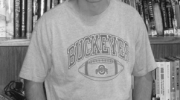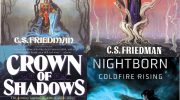 They say the best books find you when you’re not looking. I came to Duskfall unaware of the praise it was gaining elsewhere. The cover didn’t give me anything to go on, but like the story within it was elegantly complex.
They say the best books find you when you’re not looking. I came to Duskfall unaware of the praise it was gaining elsewhere. The cover didn’t give me anything to go on, but like the story within it was elegantly complex.
Reviewers have compared Duskfall to absolutely everything there is. I suspect that’s because of the wide range of influences behind The Chaos Queen series. Christopher is a walking testimony as to what happens when you blend Whedon’s Buffy the Vampire Slayer, Final Fantasy and ballroom dancing with a healthy dollop of academic study.
Thank you for joining us at SFFWorld, Christopher. It’s tricky for me to talk about the novel in any depth without spoiling the overall experience for other readers. With the social media being a fantastic network for such things, how do you feel about spoilers?
Personally I have very little problem with them, oddly enough! With a few exceptions, I don’t really care if the ending of a movie, book, or tv show is spoiled for me, and–confession time–more often than not I seek out those spoilers myself ?. I think a lot of this has to do with the fact that what I REALLY care about in any story are the characters–plot, setting, and everything else take a back seat for me. I’m there to go on a journey with the characters, and the twists and turns don’t seem as important as the journey itself. I still enjoy a good twist, of course, I just don’t mind if I happen to figure it out beforehand.
That said, just because I don’t mind them doesn’t mean I want to spoil everything for everyone else! I still try to be very conscious of revealing spoilers to other people, whether from my own work or another author’s.
Tropes in fantasy are par for the course, but with Duskfall you take several of them and set them on their heads – or remove the head entirely. When you set out to write Duskfall did you plan to wrangle with the paradigm, or did the character and world building make this come about?
The anxiety of influence is a real thing–just ask Harold Bloom–and I feel the constant weight of all of the writers who have come before me, as well as my contemporaries in the field. It’s not so much a competitive weight as a pressure to simply grow as a writer and get better at the craft, but the weight is there and ever-present.
I think just about every writer has to deal with that, whether they realize it or not. Part of writing stories, for me, is figuring out how to wrangle with, distort, and personalize the paradigms of the genre. It’s all about taking things I know/love/hate or find enthralling/terrifying/strange and making them new, both for myself and for my readers. When I wrote the first draft of Duskfall I wanted to tell a good story about great characters, and that was pretty much the only thing on my mind, but I addressed typical genre tropes anyway, mostly subconsciously–some of the innovations you see in DF came organically through that first draft, while others I chose to add in later as part of the revision process.
TL,DR: I definitely wanted to “wrangle with the paradigm” (great way to put it by the way!), but it wasn’t heavily on my mind during the writing process. Most of wrangled tropes in DF came about organically, while a few others were added in revisions.
“Write what you know” is the confusing advice to anyone wanting to write their own novels. How much of your own life experiences are reflected in the challenges Knot, Cinzia, and Winter must deal with?
Certainly bits and pieces, but I’m generally not one to base entire characters on myself or people I know. While I’ve never been an assassin, vampire, or had access to magic of any kind, I have struggled with and felt the effects of faith crises, addictions, and relationships in general. As a writer I think it’s almost impossible for me to stop my own life experiences from seeping into my characters and stories.
How difficult was it to build the psionic talents into the story line? Was creating a believable ‘magic’ and all its repercussions one of the harder parts of writing the book?
The magic system was definitely one of the more difficult parts of the novel for me. Characters and plot ideas usually aren’t that difficult for me to scrounge up, but magic systems are tough. The more I use magic in my novels, the more the reader needs to understand that magic, and that means coming up with concrete laws to which the magic must adhere. Arthur C. Clarke is famous for saying that “any sufficiently advanced technology is indistinguishable from magic,” and I’d say the reverse is true as well: any sufficiently defined magic system is indistinguishable from technology. When I’m defining the rules of a magic system, it almost feels like I’m back in science class!
By enabling some characters to access psimancy, faltira crystals are a two edged sword. The crystals make Winter’s  challenges all the more difficult. What personal kryptonite could you not live without?
challenges all the more difficult. What personal kryptonite could you not live without?
Soda. Namely Mountain Dew in any form, but Dr. Pepper and Coke as well. I know it’s terrible for me. I know how many calories and how much sugar is in each bottle. I’ve tried to go without it, and I’ve even succeeded for varying lengths of time (up to a year), but what I ultimately realized is that I just don’t want to go without it. So, while moderation is definitely the goal, I still enjoy a good soda probably more often than I should.
Both Mistborn and A Song of Ice and Fire were pivotal novels for you as a reader as much as a writer. You also have a love for gaming and films. If we were to erase one of these influences from history, aside from the monumental hole it would cause in the space-time continuum and the cosplay community, which one would you most hate to see go, and how do you think it would impact your work today?
Films. Hands down. No contest. Video games are fantastic, but they just haven’t achieved the same storytelling caliber as movies (yet). And while Mistborn and A Song of Ice and Fire are both incredible works of literature–and have influenced my development as a writer significantly–as long as it’s just those books and no others, I think I could live without them.
Films, though. If they were erased from history, I’m not sure I’d be a writer at all. At the very least, I don’t think I’d have nearly the understanding of character arcs, dialog, and visual storytelling that I do today.
Duskfall is the first in the Chaos Queen series, and you are well into the edits for the second novel. Do you have any other projects you’re working on?
Of course! But, unfortunately, they’re all pretty much at a standstill until I get the latest draft of Book 2 finished. But I’ve got drafts, outlines, and plans for a number of different side projects (short stories/novelettes/novellas) in the Chaos Queen ‘verse, and I hope to dive into them sooner rather than later. I’ve also got a YA fantasy series in the works, but that’ll probably be a ways down the road, so I’ll keep my lips sealed about that one for now :-).
Thank you for taking the time to answer my questions, I look forward to reading the rest of the series. Oh… one more thing…
Please write faster! 😀
Duskfall is available direct from Titan UK and all good bookshops. You can follow Christopher on Twitter or catch up with his antics on his website. If you’re still not sure about reading Duskfall, check out the trailer here.
***
Interview by Shellie Horst – SFFWorld.com © 2016




